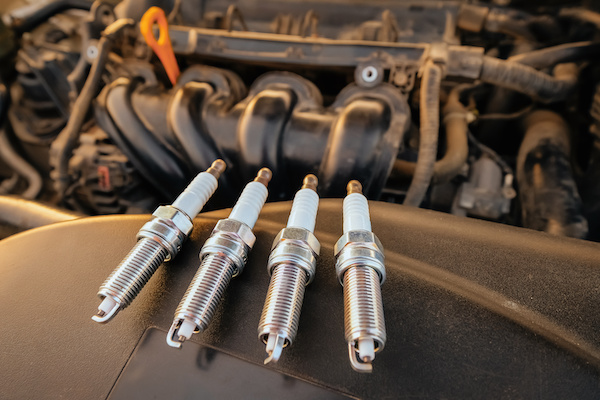When it comes to maintaining your vehicle, replacing spark plugs is a fundamental task that ensures your engine runs smoothly. However, understanding the factors that affect the time required for spark plug replacement can help you save both time and money. In this comprehensive guide, we’ll delve into the intricacies of this essential maintenance procedure, shedding light on the key factors influencing the time it takes to complete it.

Spark Plug Replacement: The Basics
Before we explore the factors impacting spark plug replacement time, let’s first establish a foundational understanding of the process.
Factors Affecting the Time Required for Spark Plug Replacement
Type of Vehicle
The make and model of your vehicle play a significant role in the time required for spark plug replacement. Different cars have varying degrees of accessibility to spark plugs, making some replacements quicker and easier than others.
Experience of the Mechanic
An experienced mechanic can perform spark plug replacement more efficiently than a novice. Their familiarity with the procedure and tools enables them to work swiftly.
Spark Plug Type
The type of spark plug being used also affects the replacement time. Standard spark plugs are generally easier and quicker to replace than high-performance or specialty plugs.
Tools and Equipment
Having the right tools and equipment readily available is crucial. A well-equipped mechanic can complete the job faster and with greater precision.
Engine Configuration
Engines come in various configurations, such as inline, V-shaped, or horizontally opposed. The layout of your engine can impact the accessibility of spark plugs, influencing replacement time.
Maintenance History
Regular maintenance can prevent issues that might extend the spark plug replacement process. Neglecting maintenance tasks may lead to complications, increasing the time required.
Spark Plug Location
The location of the spark plugs within the engine can vary. Some are easily accessible, while others may require the removal of additional components, leading to a longer replacement time.
Environmental Factors
Working conditions, such as extreme temperatures or adverse weather, can affect the ease and speed of spark plug replacement.
Gasket and Seal Condition
The condition of gaskets and seals can impact the replacement process. Damaged or worn-out gaskets may necessitate extra time for replacement and sealing.
Wiring and Ignition System
The intricacies of the wiring and ignition system can also influence the time required. Complicated systems may require more meticulous work.

Expert Tips for Efficient Spark Plug Replacement
Now that we’ve covered the factors affecting spark plug replacement time let’s explore some expert tips to streamline the process.
Factors Affecting the Time Required for Spark Plug Replacement
Proper Preparation
Ensure you have all the necessary tools, equipment, and replacement spark plugs before starting the job.
Follow Manufacturer Guidelines
Refer to your vehicle’s manual for specific instructions and recommendations related to spark plug replacement.
Safety First
Always prioritize safety. Disconnect the battery and wear appropriate safety gear to protect yourself.
Take Your Time
Rushing the process can lead to mistakes. Work methodically, paying attention to detail.
Regular Maintenance
Stick to a regular maintenance schedule to prevent complications that can extend replacement time.
Seek Professional Help
If you lack experience or confidence, don’t hesitate to consult a professional mechanic.
Spark Plug Type and Condition
When it comes to spark plug replacement, the type and condition of the spark plugs in your vehicle play a significant role in determining how much time the task will take. Here, we’ll explore how different spark plug types and their condition can affect the replacement process.
Spark Plug Types
Standard Spark Plugs:
These are the most common spark plug type and are usually the easiest to replace. They are often made of copper or nickel.
Iridium Spark Plugs:
Iridium plugs have a longer lifespan and provide better performance but can be harder to find and more expensive.
Platinum Spark Plugs:
Platinum plugs offer improved durability and longevity compared to standard plugs, making them a popular choice for many modern vehicles.
Double Platinum and Iridium Plugs:
Some vehicles come equipped with double platinum or iridium plugs, which may require more time and precision during replacement.
Spark Plug Condition
New Spark Plugs:
If you are replacing relatively new and clean spark plugs, the process is straightforward and less time-consuming.
Old and Worn Spark Plugs:
Spark plugs that are old, worn, or fouled with deposits can prolong replacement time. Removal may require more effort, and additional cleaning may be necessary.
Damaged Spark Plugs:
In cases where the spark plugs are damaged or seized, extracting them can be a time-consuming challenge. Special tools and techniques may be needed.
Corrosion and Rust:
Corrosion or rust on the spark plug threads can make removal difficult. Extra care is required to avoid damaging the threads in the engine cylinder head.

Spark Plug Accessibility
The accessibility of your vehicle’s spark plugs is another critical factor that affects the time required for replacement. Different vehicle models and engine configurations can significantly impact how easily you can access and replace the spark plugs.
Engine Layout
Front-Engine Vehicles:
In most front-engine vehicles, the spark plugs are relatively accessible from the front of the engine bay, making replacement more straightforward.
Mid-Engine and Rear-Engine Vehicles:
Vehicles with mid or rear-mounted engines often have spark plugs located in less accessible positions, requiring additional disassembly or specialized tools.
Obstacles and Components
Engine Covers:
Some vehicles have engine covers that need to be removed before accessing the spark plugs.
Intake and Exhaust Components:
The presence of intake manifolds, exhaust headers, or other components can obstruct access to the spark plugs, increasing replacement time.
Vehicle Make and Model
Compact Cars:
Compact cars generally have less cluttered engine bays, making spark plug replacement quicker and easier.
SUVs and Trucks:
Larger vehicles may have more components in the engine bay, which can complicate access to the spark plugs.
Sports Cars:
Sports cars with high-performance engines may have tighter engine bays, requiring additional time and skill for spark plug replacement.
FAQs
Q: Can I replace spark plugs myself?
A: Yes, if you have the necessary tools and experience. However, seeking professional help is advisable if you’re unsure.
Q: How often should spark plugs be replaced?
A: The recommended interval for spark plug replacement varies by vehicle. Consult your manual for guidance.
Q: Are there any signs that indicate the need for spark plug replacement?
A: Yes, symptoms like rough idling, poor acceleration, and increased fuel consumption can indicate worn-out spark plugs.
Q: Do all spark plugs require the same replacement procedure?
A: No, the procedure may vary depending on the type and location of the spark plugs.
Q: Can I reuse spark plugs?
A: It’s not recommended. Replacing with new spark plugs ensures optimal engine performance.
Q: How can I extend the lifespan of my spark plugs?
A: Regular maintenance, using the correct spark plug type, and addressing issues promptly can extend spark plug lifespan.
Conclusion
Understanding the factors affecting the time required for spark plug replacement empowers vehicle owners to make informed decisions and ensure their engines run efficiently. By following expert tips and prioritizing proper maintenance, you can minimize replacement time and keep your vehicle running smoothly.







